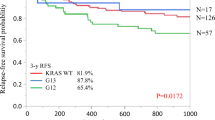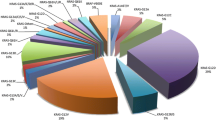Abstract
Purpose
Kras mutations are negative predictors of anti-EGFR therapy, occurring in 40% of colorectal carcinomas (CRCs). Point substitutions in codon 12 or 13 are the most frequent mutations in Kras, but multiple mutations (MMs) in other codons can also develop. Few data exist on MMs with regard to their frequency and the codons and amino acids that are affected. We report two cases of Kras double mutations in codons 12 and 13 and review Kras MMs in primary CRC in PubMed databases.
Case report
A 53-year-old woman and a 70-year-old man presented with deep, invasive, moderately differentiated CRC at an advanced clinical stage. The former had regional lymph node involvement and vaginal wall neoplastic implantation, and the latter had liver metastasis. Primary tumors were examined for Kras mutations by pyrosequencing, which were confirmed by direct sequencing. Both tumors had a mutation in codons 12 and 13, wherein codon 12 was mutated to GAT, and codon 13 became GAC.
Conclusions
We identified 69 reported cases of Kras MMs and reported two other cases, representing 2.1% of all mutated tumors; the incidence of such mutations is 1.0% in CRC patients. In most cases (59%), MMs develop in a single codon, usually codon 12. Codons 12 and 13 are affected simultaneously in only 27% of cases. These findings add information about the impact of specific amino acid changes in the Kras gene.

Similar content being viewed by others
References
Amado RG, Wolf M et al (2008) Wild-type KRAS is required for panitumumab efficacy in patients with metastatic colorectal cancer. J Clin Oncol 26(10):1626–1634
Andreyev HJ, Norman AR et al (2001) Kirsten ras mutations in patients with colorectal cancer: the ‘RASCAL II’ study. Br J Cancer 85(5):692–696
Andreyev HJ, Norman AR et al (1998) Kirsten ras mutations in patients with colorectal cancer: the multicenter "RASCAL" study. J Natl Cancer Inst 90(9):675–684
Bardelli A, Siena S (2010) Molecular mechanisms of resistance to cetuximab and panitumumab in colorectal cancer. J Clin Oncol 28(7):1254–1261
Bouchahda M, Karaboue A et al (2010) Acquired KRAS mutations during progression of colorectal cancer metastases: possible implications for therapy and prognosis. Cancer Chemother Pharmacol 66(3):605–609
Breivik J, Meling GI et al (1994) K-ras mutation in colorectal cancer: relations to patient age, sex and tumour location. Br J Cancer 69(2):367–371
Brink M, de Goeij AF et al (2003) K-ras oncogene mutations in sporadic colorectal cancer in The Netherlands Cohort Study. Carcinogenesis 24(4):703–710
Capella G, Cronauer-Mitra S et al (1991) Frequency and spectrum of mutations at codons 12 and 13 of the c-K-ras gene in human tumors. Environ Health Perspect 93:125–131
Cerottini JP, Caplin S et al (1998) The type of K-ras mutation determines prognosis in colorectal cancer. Am J Surg 175(3):198–202
De Roock W, Piessevaux H et al (2008) KRAS wild-type state predicts survival and is associated to early radiological response in metastatic colorectal cancer treated with cetuximab. Ann Oncol 19(3):508–515
Do H, Krypuy M et al (2008) High resolution melting analysis for rapid and sensitive EGFR and KRAS mutation detection in formalin fixed paraffin embedded biopsies. BMC Cancer 8:142
Hayes VM, Westra JL et al (2000) New comprehensive denaturing-gradient-gel- electrophoresis assay for KRAS mutation detection applied to paraffin-embedded tumours. Genes Chromosom Cancer 29(4):309–314
Italiano A, Hostein I et al (2010) KRAS and BRAF mutational status in primary colorectal tumors and related metastatic sites: biological and clinical implications. Ann Surg Oncol 17(5):1429–1434
Jonsson M, Ekstrand A et al (2009) Experiences from treatment-predictive KRAS testing; high mutation frequency in rectal cancers from females and concurrent mutations in the same tumor. BMC Clin Pathol 9:8
Kampman E, Voskuil DW et al (2000) Animal products and K-ras codon 12 and 13 mutations in colon carcinomas. Carcinogenesis 21(2):307–309
Karapetis CS, Khambata-Ford S et al (2008) K-ras mutations and benefit from cetuximab in advanced colorectal cancer. N Engl J Med 359(17):1757–1765
Keller G, Geist B et al (2009) Novel multiple, monoallelic KRAS mutations at codon 12 and 13. Int J Cancer 125(11):2744–2745
Kimura K, Nagasaka T et al (2007) No duplicate KRAS mutation is identified on the same allele in gastric or colorectal cancer cells with multiple KRAS mutations. J Int Med Res 35(4):450–457
Lievre A, Blons H et al (2010) Oncogenic mutations as predictive factors in colorectal cancer. Oncogene 29(21):3033–3043
Ma ES, Wong CL et al (2009) Detection of KRAS mutations in colorectal cancer by high-resolution melting analysis. J Clin Pathol 62(10):886–891
Moerkerk P, Arends JW et al (1994) Type and number of Ki-ras point mutations relate to stage of human colorectal cancer. Cancer Res 54(13):3376–3378
Neumann J, Zeindl-Eberhart E et al (2009) Frequency and type of KRAS mutations in routine diagnostic analysis of metastatic colorectal cancer. Pathol Res Pract 205(12):858–862
Plesec TP, Hunt JL (2009) KRAS mutation testing in colorectal cancer. Adv Anat Pathol 16(4):196–203
Sameer AS, ul Rehman S et al (2009) Molecular gate keepers succumb to gene aberrations in colorectal cancer in Kashmiri population, revealing a high incidence area. Saudi J Gastroenterol 15(4):244–252
Samowitz WS, Curtin K et al (2000) Relationship of Ki-ras mutations in colon cancers to tumor location, stage, and survival: a population-based study. Cancer Epidemiol Biomark Prev 9(11):1193–1197
Seth R, Crook S et al (2009) Concomitant mutations and splice variants in KRAS and BRAF demonstrate complex perturbation of the Ras/Raf signalling pathway in advanced colorectal cancer. Gut 58(9):1234–1241
Spano JP, Fagard R et al (2005) Epidermal growth factor receptor signaling in colorectal cancer: preclinical data and therapeutic perspectives. Ann Oncol 16(2):189–194
Tol J, Dijkstra JR et al (2009) High sensitivity of both sequencing and real-time PCR analysis of KRAS mutations in colorectal cancer tissue. J Cell Mol Med 14(8):2122–2131
Urosevic N, Krtolica K et al (1993) Prevalence of G-to-T transversions among K-ras oncogene mutations in human colorectal tumors in Yugoslavia. Int J Cancer 54(2):249–254
Van Krieken JH, Jung A et al (2008) KRAS mutation testing for predicting response to anti-EGFR therapy for colorectal carcinoma: proposal for an European quality assurance program. Virchows Arch 453(5):417–431
Wang HL, Lopategui J et al (2010) KRAS mutation testing in human cancers: the pathologist's role in the era of personalized medicine. Adv Anat Pathol 17(1):23–32
Yunxia Z, Jun C et al (2010) Mutations in epidermal growth factor receptor and K-ras in Chinese patients with colorectal cancer. BMC Med Genet 11:34
De Roock W, Claes B, Bernasconi D et al (2010) Effects of KRAS, BRAF, NRAS, and PIK3CA mutations on the efficacy of cetuximab plus chemotherapy in chemotherapy-refractory metastatic colorectal cancer: a retrospective consortium analysis. Lancet Oncol 11(8):753–762
Vaughn CP, ZoBell SD et al (2011) Frequency of Kras, BRAF and NRAS mutations in colorectal cancer. Genes Chromosom Cancer 50(5):307–312
De Roock W, Jonker DJ et al (2010) Association of KRAS p.G13D mutation with outcome in patients with chemotherapy-refractory metastatic colorectal cancer treated with cetuximab. JAMA 304(16):1812–1820
Conflicts of interest
The authors declare that they have no conflict of interest.
Author information
Authors and Affiliations
Corresponding author
Rights and permissions
About this article
Cite this article
Macedo, M.P., Andrade, L.D., Coudry, R. et al. Multiple mutations in the Kras gene in colorectal cancer: review of the literature with two case reports. Int J Colorectal Dis 26, 1241–1248 (2011). https://doi.org/10.1007/s00384-011-1238-0
Accepted:
Published:
Issue Date:
DOI: https://doi.org/10.1007/s00384-011-1238-0




